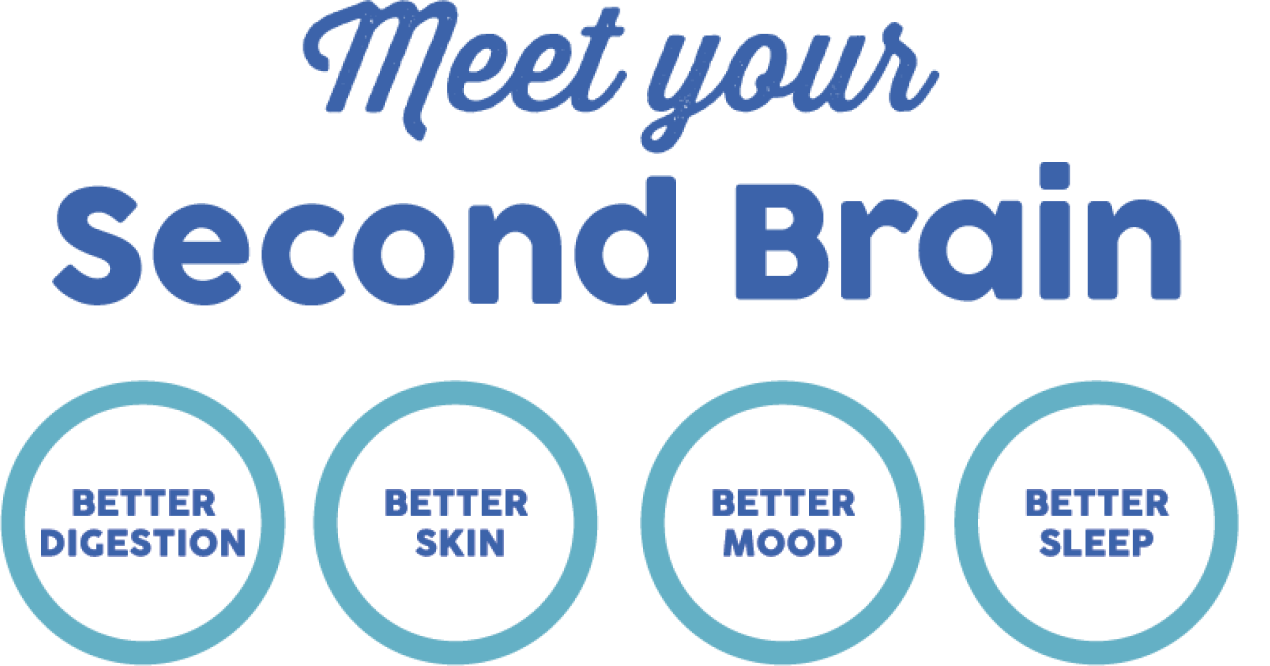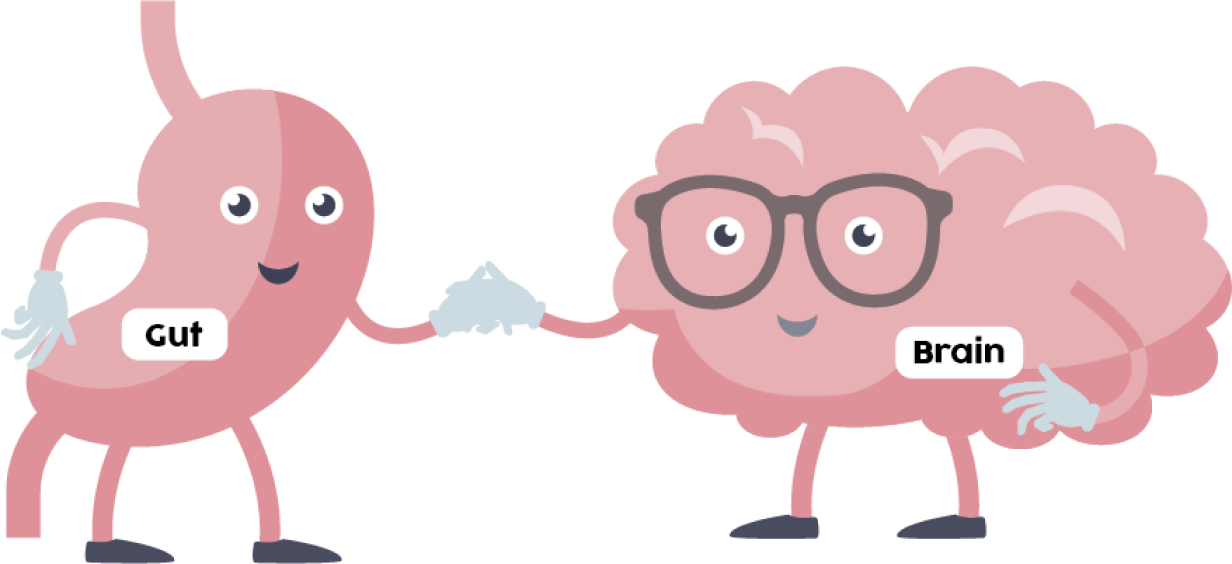




Why is the gut called the second brain?
The enteric nervous system that regulates our gut is often called the body’s “second brain.” Although it can’t compose poetry or solve equations, this extensive network uses the same chemicals and cells as the brain to help us digest and alert the brain when something is amiss.
The gut-brain axis is a bidirectional communication network that links the enteric and central nervous systems. This network is not only anatomical, but it extends to include endocrine, humoral, metabolic, and immune routes of communication as well. The autonomic nervous system, hypothalamic-pituitary-adrenal (HPA) axis, and nerves within the gastrointestinal tract, all link the gut and the brain, allowing the brain to influence intestinal activities, including activity of functional immune effector cells; and the gut to influence mood, cognition, and mental health.
Signs you may have an unhealthy gut.
1. You have an upset stomach. Frequent discomfort, gas, bloating, constipation, diarrhea, and heartburn could be signs that your gut is having a hard time processing food and eliminating waste.
2. You feel tired more often than not. People with chronic fatigue may have imbalances in the gut. One study found that almost half of people with fatigue also had IBS.
3. You have trouble sleeping in general. An unhealthy gut can cause insomnia and poor sleep, which leads to fatigue. The majority of your body’s serotonin, which affects mood and sleep, is produce in the gut. So, when there’s bacteria or inflammation in the gut, your sleep may be affected as well.
4. You are intolerant to some foods. Food intolerances may be caused by poor quality of bacteria in the gut. You may have a food intolerance if you struggle to digest certain foods. This can cause bloating, gas, diarrhea, nausea, and abdominal pain.
5. You have extreme food cravings, especially sugar. Eating too much sugar can cause too much “bad” bacteria in the gut. High amounts of sugar, especially high-fructose corn syrup, are linked to inflammation in the body and puts you at risk for other diseases.
6. You have unintentional weight gain or loss. When your gut is imbalanced, your body may struggle to absorb nutrients, store fat, and regulate blood sugar. Weight loss or gain may be caused by bacteria overgrowth or lack of nutrients.
7. You have skin irritations. Some skin conditions like acne, eczema, and psoriasis may be related to gut issues.
8. You get migraines. There may be a link between headaches and gut health, especially if you experience nausea or vomiting with migraines. Studies suggest that people with frequent headaches are more likely to have gastrointestinal disorders too.
9. You have autoimmune problems. Some “bad” gut bacteria may trigger autoimmune conditions like thyroid issues rheumatoid arthritis, multiple sclerosis, and type 1 diabetes.
10. You have frequent mood changes. Gut problems and inflammation in the nervous system can lead to anxiety and depression.
How do you balance your gut health?
Eat plenty of whole foods. The body needs the components in real, fresh food to repair damage and rebuild healthy new tissue. Whole foods are full of vitamins, minerals, and phytonutrients, plus enzymes the small intestine needs to heal. However, many patients have a difficult time digesting “healthy foods.” It’s important to keep track how your body reacts to these foods. Keep track of the frequency and a change in bowel habits such as harder, looser, or more urgent stools than usual.
Diets lacking in whole nutrient dense foods and high in processed foods is associated with changes in mood, behavior, anxiety, etc
Prioritize Foods: Limit starchy vegetables (corn and potatoes) and get 3-4 servings of lean protein each day (chicken, turkey, fish, eggs, beans). Make sure to rotate protein sources. Eat plenty of healthy, whole-food fats like extra virgin olive and coconut oil, avocados, raw walnuts and pumpkin seeds — they help strengthen cellular membranes.
As your body heals, it will get rid of toxins and unhealthy byproducts through your large intestine. You’ll need adequate fiber to eliminate the toxic waste material as quickly and efficiently as possible.
Eat fermented foods. To get your good probiotic bugs to stick around, eat daily servings of prebiotic- and probiotic-rich foods such as kefir, yogurt (dairy or nondairy),sauerkraut, tempeh, and kombucha.
Fiber: The best high-fiber foods are colorful vegetables, berries, legumes, nuts, seeds, and whole-kernel grains.
- Adults should get at least 30 grams of fiber each day
- For children 3-18 years use the “age+5” rule (10 years + 5 = 15g of fiber)
Water: Drink at least half your body weight in ounces of water each day. So, if you weigh 200 pounds, you should aim to drink a minimum of 100 ounces of water daily. This will ensure you are detoxifying and eliminating properly.
Exercise regularly: Moving your body improves the healthy microbes in your body, keeps your bowel movements regular, and prevents disease while improving your overall health.
Get enough sleep: Aim for 7-8 hours each night will help balance your hormones and prevent many scenarios that can negatively impact your digestive health, like stress or eating too close to bedtime.
Reduce stress: Some studies show that people who have early life stress more likely to develop IBS. Finding ways to manage your stress can help manage your gut, too.
Wellness Supplements to promote and achieve optimal gut health:
Digestive enzymes: The lining of the intestinal tract is lined with millions of villi and microvilli which are finger-like projections covered with digestive enzymes that help us digest and absorb nutrients. These enzymes are what the body needs to break food into its individual parts in order to be used by our cells: carbs, fats, and proteins. In a leaky gut, where these villi have become damaged and there are literally holes in the gut, enzyme support is crucial to healing and rebuilding villi. Taking supplemental enzymes before you eat gives the GI tract a jump-start on digestion, making food easier to break down and nutrients easier to absorb. In most cases, the villi rebound over the course of a few weeks, but it may take well over a month.
Glutamine: The most plentiful free amino acid in the body that supports immunity and digestion by fueling the cells that line the small intestine.
Glutamine is important for removing excess ammonia (a common waste product in the body). It also helps your immune system function and may be needed for normal brain function and digestion. You can usually get enough glutamine without taking a supplement because your body makes it and you get some in your diet.
Add Pre and Prebiotics To Your Diet:
Prebiotics: Prebiotics are a source of food for your gut’s healthy bacteria. They’re carbs your body can’t digest. So they go to your lower digestive tract, where they act like food to help the healthy bacteria grow. Probiotics are live yeasts and good bacteria that live in your body and are good for your digestive system.
Probiotics: Once your body has patched up the leaks in the gut, you need to help it grow a healthy layer of good bacteria — flora that help protect the GI tract and assist with digestion. Probiotic therapy rejuvenates and replenishes a microbiome damaged by antibiotics or a poor diet.
By colonizing a healthy layer of beneficial bacteria it can strengthen the immune system, improve metabolism and digestion, help your body make vitamins (B and K), and aid in the absorption of nutrients. The two most important groups of probiotics are Lactobacilli and Bifidobacterium.
Please note it is important to include a probiotic that contains a variety of healthy bacteria to colonize the different parts of the small and large intestine. Look for probiotics supplements that include the bifidobacterium species infantis, longum, bifidum as well as the lactobacillus species reuteri, plantarum, and acidophilus. Remember to rotate your probiotic supplement every 3 months. This will ensure the intestinal tract gets a variety of healthy bacteria.
Omega-3 fatty acids: The gut uses fatty acids to calm inflammation and rebuild healthy cell walls.
Omega-3 fatty acids may help improve the integrity of the intestinal barrier, a protective wall inside the stomach which allows nutrients from food to pass through the body to be used for energy and blocks harmful microbes and toxins from entering the bloodstream.
Vitamin D: Helps decrease IBS symptoms. Vitamin D deficiency may increase the risk of chronic constipation. Vitamin D also helps maintain the physical and functional integrity of the gut mucosal barrier by reducing the permeability of epithelial cells and modulating tight-junction proteins,5 preventing invasion of pathogenic bacterial species.
Collagen: Collagen supplements do indeed aid digestion. Collagen supports the digestive tract’s structural integrity and actively assists in nutrient breakdown and absorption. Incorporating collagen supplements into your diet can greatly enhance digestive efficiency and overall gut health.
Bonus Recommendations:
1. Bone Broth to heal the gut and nourish the body
- Consider making grass-fed bone broth from pasture-raised beef and organic vegetables for nourishment and gut healing.
- Contains collagen, calcium, essential amino acids and other nutrients that heal the lining of the GI tract. It is anti-inflammatory.
- Sip on it as a broth or add it to sauces, soups, gravies or other recipes for added nutrition and flavor.
- To make it yourself (which is affordable and easy) see the instructions are below.
If the thought of making bone broth is overwhelming there are pre-made sources available. Kettle and Fire and Bare & Bones are a couple brands available for purchase online.
Grass-Fed Beef Broth
1. Purchase grass-fed beef bones (rec: marrow bones) at Whole Foods, butcher or farmers marke
2. Put the bones in the slow cooker, cover with olive oil, salt and pepper, brown for 30 minutes, rotate them halfway through
3. Add water, add some form of acid (squeeze of lemon or small amount of vinegar), cover, simmer x 24-48 hours
4. Add organic vegetables of your choice—carrots, celery, onion, garlic…
5. Some people skim the fat off the top. This is optional.
6. Don’t be shy, eat the marrow.
NOTE: If you don’t have a slow cooker, don’t worry. Place the bones in aluminum foil, cover in olive oil, salt and pepper, wrap, place in oven for 30 minutes. Then take them out, at the bones to a large pot, add water, salt, pepper, lemon juice and cook for as long as you’re home and able to watch the pot. When you have to leave home or go to sleep, turn it off, store it in the fridge, then resume cooking when you can. Try for cooking a total of 24-48 hours.
2. Digestive Bitters
Some people have gastrointestinal issues due to the fact that they don’t have enough stomach acid. In these cases, bitters can help create some of that extra juice to help break down food. Bitters increase the amount of gastric juices in your stomach, which ultimately helps with your digestion.
